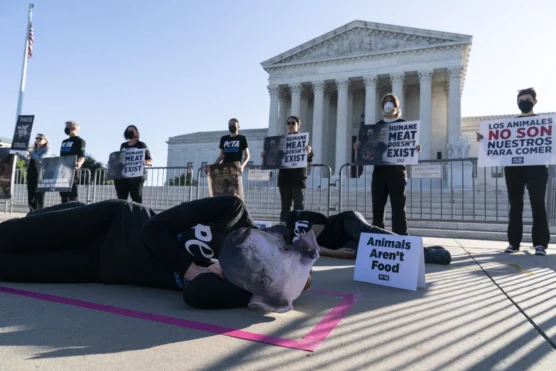By Kelsey Reichmann
WASHINGTON (CN) — The Supreme Court allowed a California law governing pork standards to move forward on Thursday despite industry claims over its broad reach.
“Companies that choose to sell products in various States must normally comply with the laws of those various states,” Justice Neil Gorsuch wrote in the court’s lead opinion.
At issue in the case was California’s Proposition 12, which was passed in 2018 to prevent animal cruelty and protect the health and safety of California consumers. Among its standards for pork sold in the state, Prop 12 mandates that pork meat must come from pigs born to a sow housed in a 24-square-foot pen, big enough that the animal room can turn around without touching the enclosure.
The problem is California imports the majority of its pork meat, leaving producers outside of California’s borders to comply with a law they did not pass. The pork producers claim that the nation’s entire pork production system would have to be reconstructed to comply with California’s law since it is impossible to determine where meat might end its journey.
In 2019, the National Pork Producers Council and the American Farm Bureau Federation sued California. A panel of the Ninth Circuit affirmed dismissal of the case before the high court intervened.
Gorsuch emphasized that Congress can use its authority to regulate pork just like other products, but it had not done so here.
“Despite the persistent efforts of certain pork producers, Congress has yet to adopt any statute that might displace Proposition 12 or laws regulating pork production in other States,” Gorsuch wrote.
If the pork producers’ claims of massive disruptions to the pork industry are true, Gorsuch continued, then the industry should have turned to lawmakers, not the court, to solve this problem.
“That body is better equipped than this Court to identify and assess all the pertinent economic and political interests at play across the country,” Gorsuch wrote. “And that body is certainly better positioned to claim democratic support for any policy choice it may make.”
Without an effort to sway lawmakers of their plight, Gorsuch says the pork producers may have been trying to find an easier solution to their problem.
“And with that history in mind, it is hard not to wonder whether petitioners have ventured here only because winning a majority of a handful of judges may seem easier than marshaling a majority of elected representatives across the street,” Gorsuch wrote.
The pork producers’ claim rests on the dormant Commerce Clause. Congress uses the Commerce Clause to regulate interstate commerce, but that authority is not absolute. This leaves states to also have some authority to pass laws impacting interstate commerce. But the states’ authority isn’t absolute either. The dormant Commerce Clause stymies states from putting excessive burdens on interstate commerce.
Thursday’s ruling sidesteps any statement on the dormant Commerce Clause. Gorsuch said the court did not need to engage in competing arguments concerning the doctrine to decide this case, and even if they did, the pork producers would still have a tough case to prove.
“They do not allege that California’s law seeks to advantage in-state firms or disadvantage out-of-state rivals,” Gorsuch wrote. “In fact, petitioners disavow any discrimination-based claim, conceding that Proposition 12 imposes the same burdens on in-state pork producers that it imposes on out-of-state ones. As petitioners put it, ‘the dormant Commerce Clause … bar on protectionist state statutes that discriminate against interstate commerce … is not in issue here.’”
California contends that Prop 12 isn’t that different than labeling laws or safety and quality standards. The state acknowledged that producers from out of state may have to increase prices to comply with the law but argued that California voters were informed of that consequence when they voted on the issue.
Like this:
Like Loading...
Related





 Tweet This
Tweet This Facebook
Facebook Digg This
Digg This Bookmark
Bookmark Stumble
Stumble RSS
RSS
























REAL NAMES ONLY: All posters must use their real individual or business name. This applies equally to Twitter account holders who use a nickname.
0 Comments
You can be the first one to leave a comment.